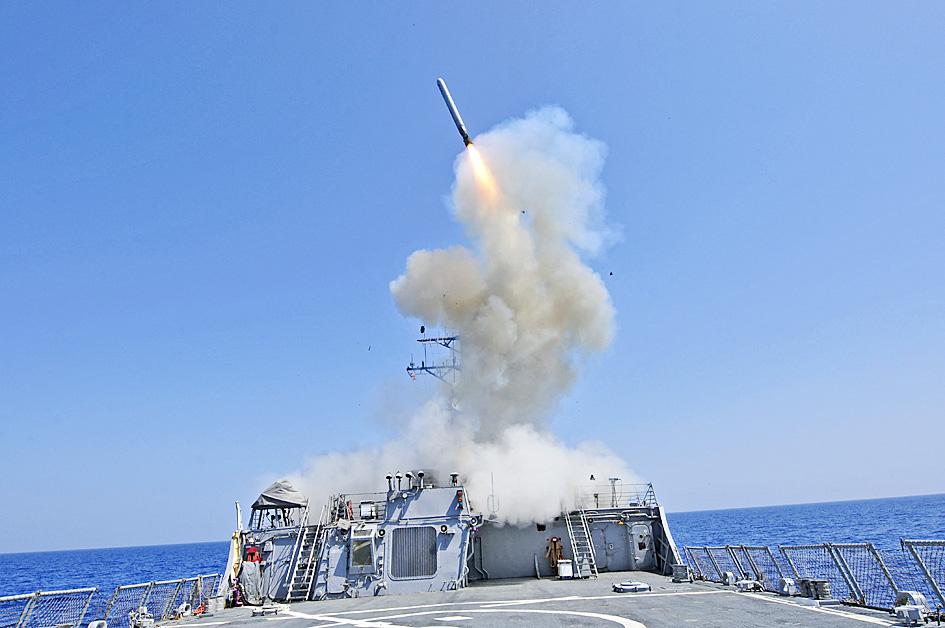A US Navy ship on Friday sailed through the Taiwan Strait, marking the ninth time a US military vessel has transited the Strait since US President Joe Biden took office in January.
The USS Barry, an Arleigh Burke-class guided-missile destroyer, conducted a “routine” transit through the Strait, the US Navy said in a statement, adding that the journey through international waters was conducted “in accordance with international law.”
“The ship’s transit through the Taiwan Strait demonstrates the US’ commitment to a free and open Indo-Pacific,” the US Navy said. “The United States military flies, sails and operates anywhere international law allows.”

Photo: AFP
The Ministry of National Defense yesterday confirmed the transit, saying the US destroyer sailed from north to south through the Strait.
The ministry said it has a grasp of the situation and uses joint intelligence, surveillance and reconnaissance tools to monitor the waters and airspace around Taiwan.
The situation was “normal” while the ship traveled through the Strait, it added.
The destroyer was in the Strait on the same day that 10 Chinese military aircraft flew into Taiwan’s air defense identification zone.
It was the 15th consecutive day that Chinese military aircraft had entered the area.
The military maneuvers are seen by some as a way for Beijing to indicate its displeasure with Taipei and warn against actions it sees as jeopardizing its hopes of annexing Taiwan.
Taipei considers such moves military threats.
On Aug. 27, the USS Kidd, an Arleigh Burke-class guided-missile destroyer, accompanied by the USCGC Munro, conducted what the US Navy called “routine transits” through the Strait.
The USS John S. McCain sailed through the Strait on Feb. 4 and April 7; the USS Curtis Wilbur on Feb. 24, May 18 and June 22; the USS John Finn on March 10; and the USS Benfold on July 28.
The most recent passage came as Taiwan concluded its annual Han Kuang military exercises and China conducted military exercises in waters near Taiwan’s southwest coast.
The Chinese People’s Liberation Army (PLA) had on Friday conducted a military drill in waters off southwestern Taiwan and in the skies over the area, the PLA’s official newspaper reported yesterday, citing Shi Yi (施毅), a spokesperson for the PLA Eastern Theater Command.
Shi did not provide specific information regarding the location of the exercise, saying only that the PLA had deployed naval vessels, early warning aircraft and bombers.
The Ministry of National Defense said that Taiwan had a “thorough grasp and assessment” of China’s military exercises.

NATIONAL SECURITY THREAT: An official said that Guan Guan’s comments had gone beyond the threshold of free speech, as she advocated for the destruction of the ROC China-born media influencer Guan Guan’s (關關) residency permit has been revoked for repeatedly posting pro-China content that threatens national security, the National Immigration Agency said yesterday. Guan Guan has said many controversial things in her videos posted to Douyin (抖音), including “the red flag will soon be painted all over Taiwan” and “Taiwan is an inseparable part of China,” while expressing hope for expedited “reunification.” The agency received multiple reports alleging that Guan Guan had advocated for armed reunification last year. After investigating, the agency last month issued a notice requiring her to appear and account for her actions. Guan Guan appeared as required,

A strong cold air mass is expected to arrive tonight, bringing a change in weather and a drop in temperature, the Central Weather Administration (CWA) said. The coldest time would be early on Thursday morning, with temperatures in some areas dipping as low as 8°C, it said. Daytime highs yesterday were 22°C to 24°C in northern and eastern Taiwan, and about 25°C to 28°C in the central and southern regions, it said. However, nighttime lows would dip to about 15°C to 16°C in central and northern Taiwan as well as the northeast, and 17°C to 19°C elsewhere, it said. Tropical Storm Nokaen, currently

‘NATO-PLUS’: ‘Our strategic partners in the Indo-Pacific are facing increasing aggression by the Chinese Communist Party,’ US Representative Rob Wittman said The US House of Representatives on Monday released its version of the Consolidated Appropriations Act, which includes US$1.15 billion to support security cooperation with Taiwan. The omnibus act, covering US$1.2 trillion of spending, allocates US$1 billion for the Taiwan Security Cooperation Initiative, as well as US$150 million for the replacement of defense articles and reimbursement of defense services provided to Taiwan. The fund allocations were based on the US National Defense Authorization Act for fiscal 2026 that was passed by the US Congress last month and authorized up to US$1 billion to the US Defense Security Cooperation Agency in support of the

PAPERS, PLEASE: The gang exploited the high value of the passports, selling them at inflated prices to Chinese buyers, who would treat them as ‘invisibility cloaks’ The Yilan District Court has handed four members of a syndicate prison terms ranging from one year and two months to two years and two months for their involvement in a scheme to purchase Taiwanese passports and resell them abroad at a massive markup. A Chinese human smuggling syndicate purchased Taiwanese passports through local criminal networks, exploiting the passports’ visa-free travel privileges to turn a profit of more than 20 times the original price, the court said. Such criminal organizations enable people to impersonate Taiwanese when entering and exiting Taiwan and other countries, undermining social order and the credibility of the nation’s